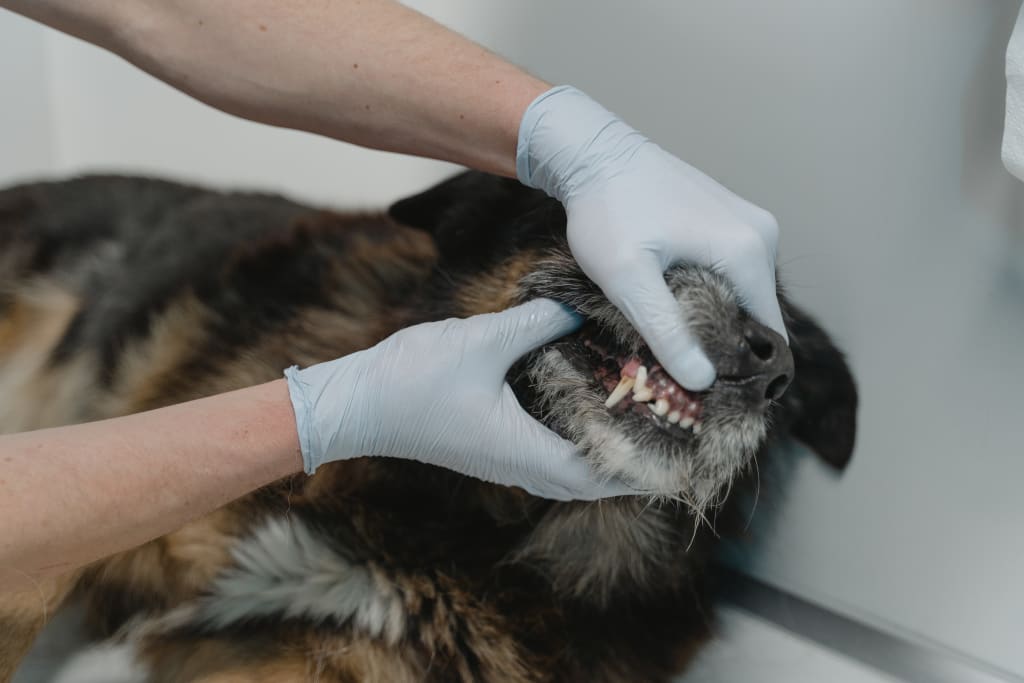
Ensuring proper dental care for dogs is essential for their overall health and well-being. Neglecting dental hygiene can lead to serious oral health issues and may even impact their overall health. Here are some valuable points highlighting the importance of dog dental care:
Preventing dental diseases: Regular dental care, including brushing and professional cleanings, helps prevent dental diseases such as periodontal disease, gingivitis, and tooth decay. These conditions can be painful and may lead to tooth loss if left untreated.
Improved breath: Bad breath in dogs can be a sign of dental problems. Regular oral care helps reduce foul-smelling breath, making interactions with your pet more pleasant.
Pain management: Dogs may suffer in silence when experiencing dental pain. By maintaining their oral health, we can prevent discomfort and ensure they enjoy a better quality of life.
Prolonging lifespan: Dental issues can lead to infections that may spread to other parts of the body, impacting the dog's overall health. Proper dental care can help extend their lifespan and improve their overall health.
Enhancing chewing function: Healthy teeth are essential for effective chewing, which aids in proper digestion and nutrient absorption. Dental problems can hinder their ability to chew, leading to nutritional deficiencies.
Behavioral improvements: Dental pain can cause dogs to exhibit behavioral changes, such as aggression or irritability. Regular dental care can contribute to a calmer and happier pet.
Cost-effective: Preventive dental care is more cost-effective than treating advanced dental problems that require extensive procedures or extractions.
Establishing a routine: Starting a dental care routine early in a dog's life helps them become accustomed to the process, making it easier for both the pet owner and the dog in the long run.
Regular vet check-ups: Dental care goes hand in hand with regular veterinarian check-ups. A vet can identify dental issues early on and recommend appropriate treatment.
Choosing the right products: Using veterinarian-approved dental products, such as toothbrushes, toothpaste, and dental chews, ensures safe and effective care for your dog's teeth.
Prioritizing your dog's dental health is crucial for their overall well-being. Regular dental care prevents oral diseases, improves their quality of life, and fosters a strong bond between you and your furry companion.
How to Prevent Dental Issues in Dogs
Preventing dental problems in dogs is vital for maintaining their overall health and happiness. By implementing a few simple practices, you can ensure your furry friend enjoys excellent dental hygiene and avoids potential oral health issues. Here's a guide on how to prevent dental problems in dogs:
Regular brushing: Establish a routine of brushing your dog's teeth at least 2-3 times a week using a dog-specific toothbrush and toothpaste. Regular brushing helps remove plaque and tartar buildup, reducing the risk of gum disease and tooth decay.
Healthy diet: Provide a balanced and nutritious diet that promotes good oral health. Avoid sugary and sticky treats that can stick to teeth and cause cavities.
Dental chews and toys: Offer dental chews and toys designed to promote chewing and help clean your dog's teeth. These aids can reduce plaque buildup and keep their gums healthy.
Avoid human dental products: Never use human toothpaste or dental products on dogs, as they can contain ingredients that are harmful to pets.
Regular veterinarian check-ups: Schedule regular dental check-ups with your veterinarian. They can perform thorough dental examinations and professional cleanings when necessary.
Monitor dental health: Keep an eye out for signs of dental issues, such as bad breath, swollen gums, drooling, or difficulty eating. If you notice any problems, consult your vet promptly.
Early intervention: Address dental problems as soon as they arise. Early treatment can prevent the condition from worsening and causing more significant health issues.
Gradual introduction: If you are starting a dental care routine with an adult dog, introduce the process gradually to help them get comfortable with toothbrushing.
Water additives: Consider using veterinarian-recommended water additives that help fight bacteria and reduce plaque accumulation.
Professional dental cleaning: In addition to regular at-home care, schedule professional dental cleanings as advised by your veterinarian. These deep cleanings can remove stubborn tartar and address hidden dental issues.
Provide access to clean water: Ensure your dog has access to fresh and clean water at all times. Staying hydrated can aid in washing away food particles and bacteria from their mouth.
Encourage chewing behavior: Offer appropriate chew toys and bones that encourage chewing. Chewing can help strengthen teeth and stimulate saliva production, which aids in neutralizing acids in the mouth.
By following these preventive measures, you can significantly reduce the likelihood of dental problems in your beloved dog. Prioritizing their dental health will lead to a happier and healthier life for your furry companion.





Comments
There are no comments for this story
Be the first to respond and start the conversation.